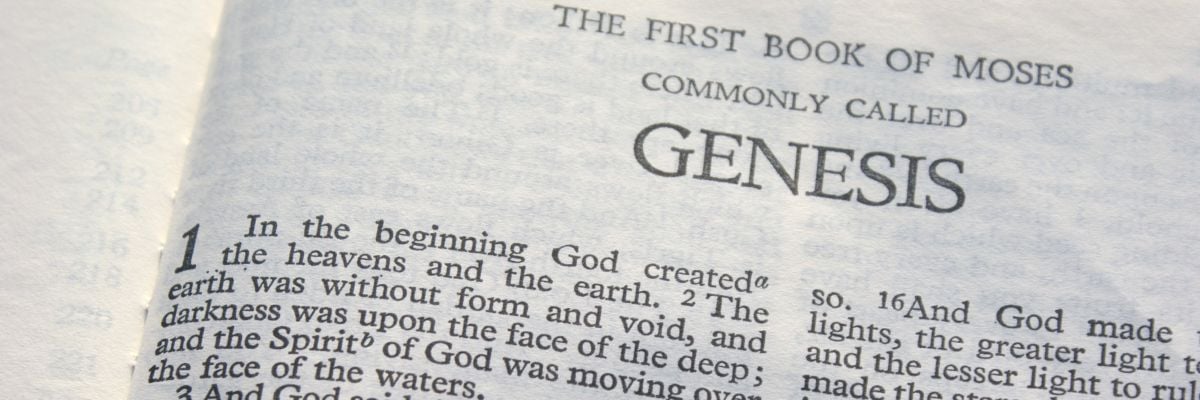
Early parts of the Bible depict humans living incredibly long lives—some of them for over 900 years! Are Catholics really supposed to believe that humans lived that much longer than they do today? Fr. Mike Schmitz discusses this question on Catholic Answers Live.
Transcript:
Caller: Did the people of old really live that long? Especially when we compare things to science, we would imagine that back in the day they didn’t have that much medical aid, I would imagine. I mean, did people really live up to 900? Are we to take things literally?
Fr. Mike Schmitz: That’s awesome, and this is one of the first questions, because right at the very first chapters of the Bible you’re like, “And then Methuselah lived for 937 years,” like, uh, are you sure? Or even, we’re in the middle of right now reading the story of Abraham and Sarah, and she’s like, “Uh, Lord, I’m a hundred years old. I don’t think I should be having kids right now,” or, you know, “I’m past the childbearing age.” Or we’re gonna get, when we get to Moses, you know, he spends 40 years in Pharaoh’s palace, years leading the people of Israel. So that’s—I’m not super good at math, but that sounds like roughly 120 years.
So the great question is, like you said: can we take these literally? For example, we can go back to Genesis 1—and not to stand over scripture, always stand underneath scripture, right? I want to clarify this, because I never want to misrepresent the posture we take towards the Bible. So I never want to say “This is what it is” unless it’s super clear that this is what it is.
So during chapter one of Genesis and the six days of creation/one day of rest, there are folks who say “Well, here’s a theory about that.” And I say, “Okay, that’s a great theory, and as long as it’s within the parameters of the dogma that we have solemnly defined by the Church, then you get to take an interpretation one way or another.” And that’s one of the biblical principles for interpretation, is: provided that it doesn’t contradict scripture, and provided that it doesn’t contradict an article of faith, then there’s opportunity to read more deeply at, like, a symbolic level. So we have the literal sense and the spiritual sense.
So it could be very truly that, when we’re talking about the ages of those first generations of human beings, that, yeah, they were specially blessed, specially anointed with excessive life. Like, really long lives. And we can say that that would be a preternatural or supernatural kind of a situation, because unless someone’s a tortoise, they’re not going to be living that long.
But also, we could say: if that’s what the word of God says, then it could be the case that in those exceptions—so the exceptional cases—that they literally lived that long. Just like Jesus literally rose from the dead. It wasn’t like he kind of came to life in their hearts. He literally rose. “That’s impossible!” Exactly. It’s called a miracle. So it would make sense that we could say: it’s within the realm of interpretation to say that when the talks about Methuselah living this long, or Moses living, you know, 120 years; no problem. That could literally be true.
Question: does it have to be literally true? And there are a number of people who would speculate and say, “Well, there’s not only the literal sense, there’s also the spiritual sense of scripture.” And it could be the case that ages correspond to blessing. It could say that—I mean, this is something I was taught. Now at the same time, I know those people who criticize that stance and say that to merely reduce it to the spiritual sense, and to ignore completely the literal sense, or potential literal sense, is being disingenuous to scripture, and so I don’t want to do that. That’s why I’m saying that it literally could be the case, and if it is, then it’s a miracle.
It also could be, in some ways, we have to interpret scripture—one of the principles for interpreting scripture is: we try to discover, discern, the original intent of the author. So if we ascribe the writing of Genesis to Moses, then we say, okay, what was Moses’ original intent? Was it to say, “Yeah, these guys lived that long”? Okay. Then hands down, literal sense. If it was to say that their ages correspond to the the amount of fruitfulness they had, or the amount of blessings they had, or even their family line kind of a thing, then great. No problem.
So that’s how I would respond to that, in the sense of: we simply can’t contradict scripture, and we’re also not just going to wipe it away or wash it away or whitewash it because it is inconvenient, or because it challenges us, it makes us have faith. Because obviously we need to have faith as we approach scripture. But again, I start with the first principle of: I don’t stand over scripture and say “This couldn’t be the case,” or “It must be the case.” I have to stand under scripture and say “Okay Lord, you teach me.” And what the Church has taught me is that this very well could be literal—if so, it’s supernatural—or it could be spiritual, in which case it also teaches me. Or it could be both.
So that’s how I would respond, Vincent, and I don’t want to have, like, a poor response, or too shaky or flimsy, so I want to kick back to Cy and ask if he has anything more to add to that one.
Host: No, I don’t. I’m not gonna add to the most popular podcaster in the world. Are you kidding me?
Fr. Mike Schmitz: I could still be wrong, though! That’s the thing.
Host: Vincent, was that a satisfying answer to you? Because I felt very satisfied with it, especially the part about—it’s perfectly possible that God could do these things. That’s not hard for God to do. I mean, you can make a universe, you can make Methuselah live 930 years. But there are also other possibilities, and we can respectfully engage with the Bible and also respect that there are other possibilities. What do you think, Vincent?
Caller: I think it makes some sense, but the thing is, there’s the additional part where I still get a little bit confused. You know, there’s a part where the Bible actually did at some point say, okay, because the wickedness of men grew widely, and then God actually said “Okay no one’s going to live beyond 120.” So, like, it actually gives me that interpretation that it was actually—people literally did live that long, and so because of the sins of men God said “Okay, we’re going to stop this.” So sometimes I struggle to reconcile this form of reasoning to, like, science and stuff like that.
Host: Ah, okay, but—Vincent, we’ll let Father hit this one more when we come back on the other side, but there’s no conflict between science and miracles. A miracle means an exception to the laws of nature because of God’s great divine power. We’ll take a quick break, we’ll be right back and we’ll address that.
Fr. Mike Schmitz: Right, and that’s so good, because—and like you had mentioned, as we went to the break, science is the pursuit of truth. And faith is, in many ways, the pursuit of truth. I mean you can say that a lot of times we believe that truth has found us, but we’ll say it like that: science is the pursuit of natural truth, and faith is the pursuit of supernatural truth.
And one of the things we know, just by ontology, by philosophy, by whatever, is that truth cannot contradict truth. And so scientific truth can never contradict truths of faith. If they do contradict, it’s either one of two things: one is that either the scientific truth or the supernatural truth is incorrect, it’s not really true; or it’s only an apparent contradiction.
And so that’s what we have to get kind of down to, because science is answering a different question than faith is answering. Science is answering the question, oftentimes, “What” and “How.” So what is this? How did it get here? Faith is answering the question “Who” and “Why.” Like, who made it? And why did they make it? Same kind of thing, like, when it comes to human beings a lot of times, like a “What” and “How.” Like, what is biology and how does it work? And then the question we ask as human persons, though, is like—but science can’t answer the question—who are you and why are you? And so that’s one of the things that we have to get into.
And also, Vincent’s question was so good because, again, it does highlight the principles for biblical interpretation, which is: we have to understand, before everything else, do our best at least to understand what was the original intent of the author? And if we understand what was the original intent of the author, then we can say—like for example, go back to Genesis 1 through 11, which is a pre-history, and so when we talk about some of these numbers, when we talk about some of these events, we’re realizing we’re talking about pre-history, which also means…doesn’t mean this, but it also includes this pre-history, this poetic history. And then you switch over to history history when we hit Genesis chapter 12 and we meet Abram and Sarai. Those first eleven chapters are a poetic history or poetic telling of life before history existed, and so we interpret it according to that understanding of the genre.
And one last thing—or maybe two last things, if you don’t mind. A lot of times, whenever I bring up the idea of, like, genre interpretation and genre, people will say “Well wait a second, how do you know that Genesis through 11 is meant to be understood poetically, and Genesis 12 to the end is meant to be understood historically? Are you just picking and choosing? What’s going on here? And I love this because we automatically do this in our modern day and age, and here’s my example.
My example is: I remember the very first episode of The Office that I ever watched. So the American TV show, The Office. I remember I was at the rectory, I was living at a different church, I was at a different parish. And I remember I was in my room and I turned on the TV, and I was standing there, and I was watching one of the episodes, and I’d never heard of this show before. And everything was telling me from the screen: this is a documentary. Like, all this setup, you know, like having the talking heads, having the interviews with people, and it’s kind of shaky cam, and no laugh track—like, everything said “This is a documentary.” But I know what documentaries are like. And after I watched it for a while, I realized “Oh, I can tell the difference between a documentary and this show,” because you know what to look for, right?
And so similarly, when you get to know scripture deeper and deeper and understand it more, “Oh, this is clearly poetry. Okay, this is clearly history. This is clearly parable.” You know, that kind of a thing. We become familiar with the genre.



